The University of Santo Tomas, through the UST Graduate School (GS) and the Center for Continuing Professional Education and Development (UST-CCPED), launched two training manuals on community engagement and organizing, and on student affairs and services on June 16, 2021.
Funded by the Commission on Higher Education (CHEd), the two manuals were products of the Simbahayan Certificate Course in Community Engagement and Organizing program and the Philippine Association of Practitioners of Student Affairs and Services-UST Student Affairs and Services Continuing Development program. The manuals aim to serve as a guide to the administrators and practitioners in the higher education institutions on services delivered by HEIs, as well as interested readers who are willing to learn more about the two learning areas.
Community Engagement and Organizing
On the one hand, the book entitled “Journeying with Communities: A Community Engagement and Organizing Handbook for University Extension Workers” is a training manual that will guide the extension workers tasked to support the partner communities build, establish, and sustain their community life and livelihood through various means.
“Journeying with Communities: A Community Engagement and Organizing Handbook for University Extension Workers highlights the public and social mission of higher education through community engagement,” said the lead author Prof. Mark Anthony D. Abenir, DSD of the Development Studies Program of the Ateneo de Manila University.
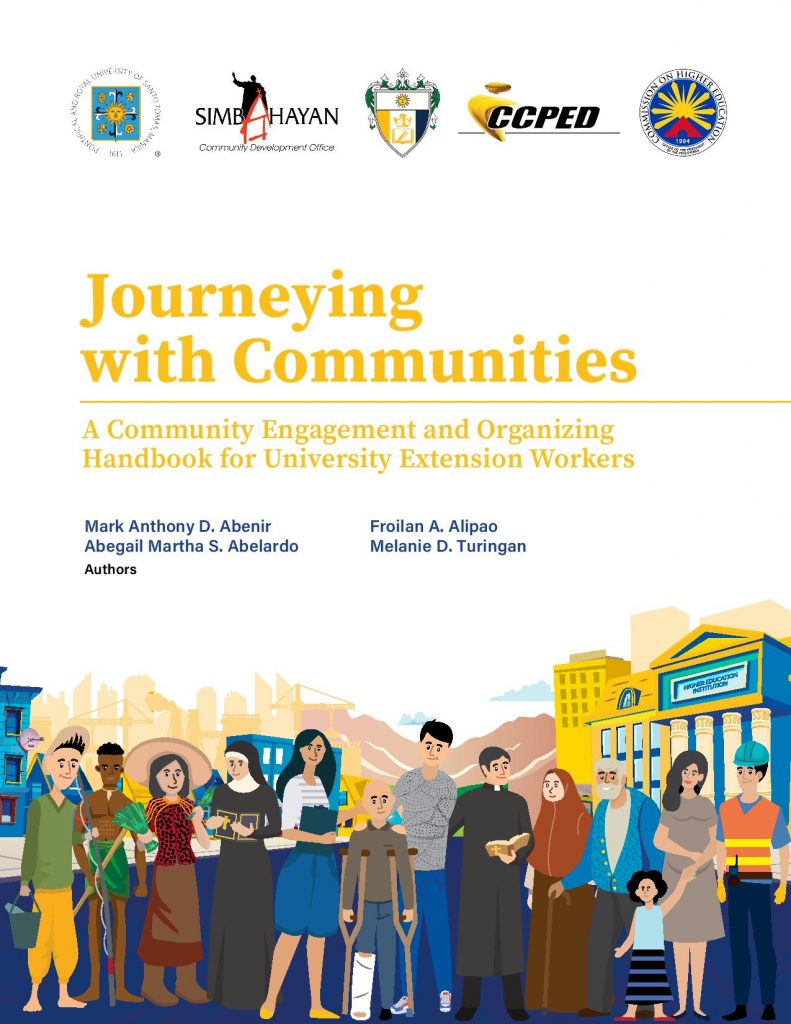
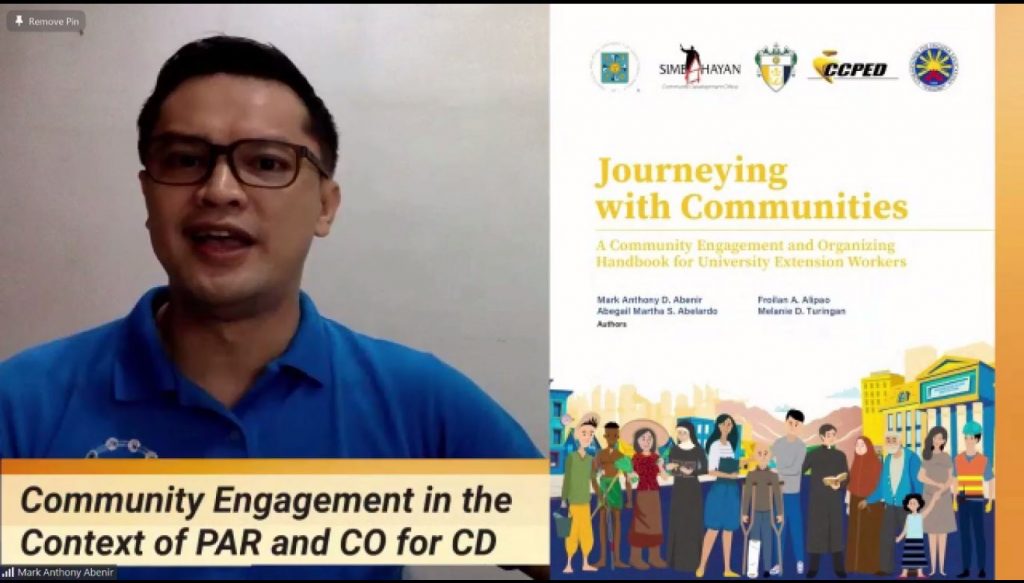
Lead author Mark Anthony D. Abenir talks about the manual.
“The unique contribution of this handbook is that it specifically situates HEI community engagement within the unique historical context of the Philippines, thus adding a Philippine voice in the literature of community-engaged scholarship. It also provides activity exercises and case studies where readers can situate themselves and apply the theories, concepts, and tools that they have learned so that they can enhance the community engagement programs, and the projects of respective colleges and universities,” Abenir added. Joining Abenir, who used to head UST’s community development office, in authoring the manual were Simbahayan Community Development Office Director Froilan A. Alipao, MCD, Assistant Registrar Melanie D. Turingan, PhD, and Simbahayan staff Abegail Martha Abelardo, MA.
Meanwhile, CCPED Director Assoc. Prof. Jocelyn F. Agcaoili, MHPEd, MSPT highlighted that the Simbahayan Certificate Course in Community Engagement and Organizing helped 60 community extension workers from 30 higher educational institution and produced 3 research papers that were represented in various fora.
Manual on Student Affairs and Services
On the other hand, the book entitled “PAPSAS-UST CCPED Training Manual: Enhancing Competencies of Student Affairs and Services Practitioners in the Philippines” is a seven-module manual that will guide school practitioners in-charge of student welfare and development.
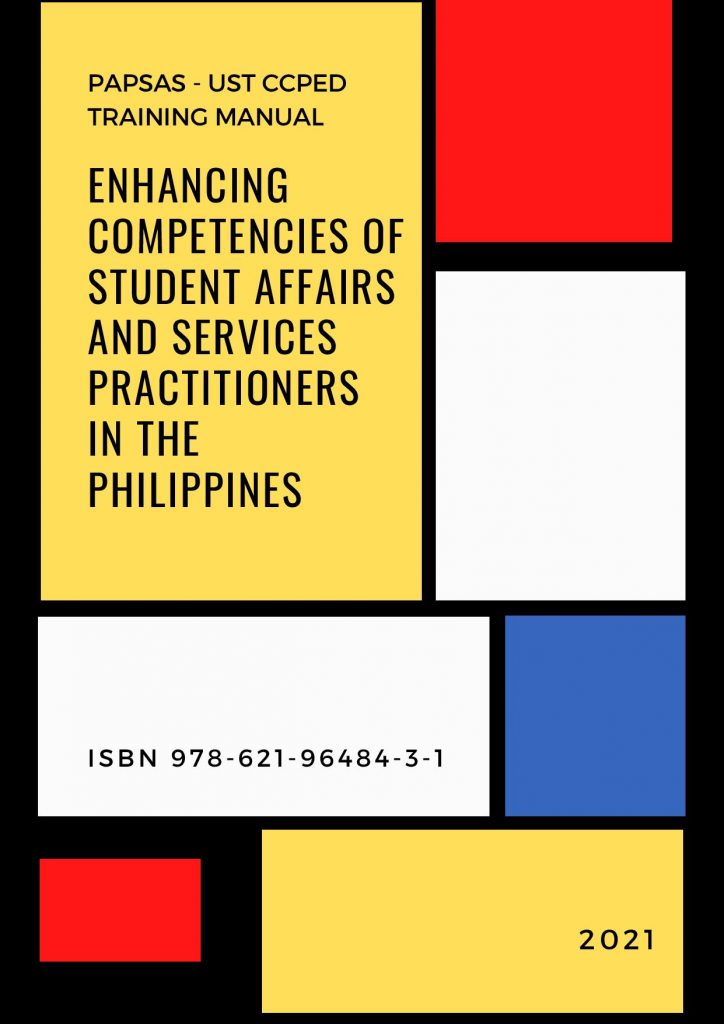
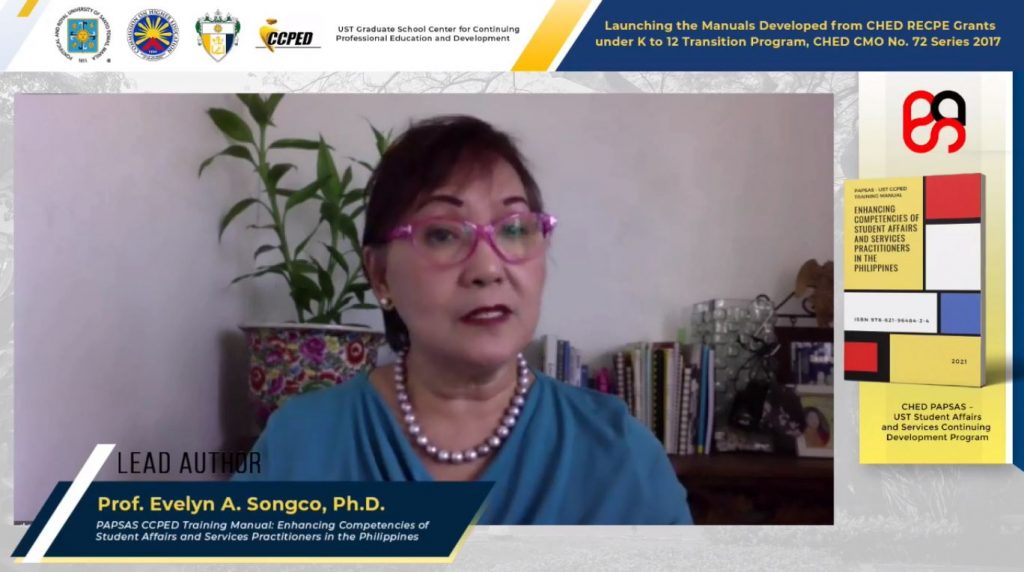
Lead author Evelyn A. Songco, PhD talks about the manual.
“Every module in the manual contains an abstract, course-intended learning outcome, discussion, learning tasks and enrichment tasks, and the opportunity for reflection and references. This training manual will be a good read for all newly appointed SAS practitioners and school human resource heads. It will give newly appointed SAS practitioners and even those who have been there for quite some time some insights on how to effectively lead the SAS office,” Prof. Evelyn A. Songco, PhD said as the lead author of the manual.
“These modules will help SAS practitioners become effective school managers and leaders. (It) will provide an initial guide on making evidence-based decision. On the other hand, it will be a great help to the human resource head in helping SAS practitioners develop their competencies,” Songco added. Joining Songco in writing the manual’s modules were Atty. Hilario Caraan, DBA and Drs. Leandro A. Loyola, Benito Teehankee, and Maria Paquita D. Bonnet of De La Salle University, Mr. Rene Salvador San Andres of Ateneo de Manila University, and UST Legal Management faculty member Atty. Antonio M. Chua.
According to Agcaoili, the PAPSAS-UST Student Affairs and Services Continuing Development program trained 119 SAS practitioners from 2 HEIs all over the country and has produced one research paper.
Embodiment of the Catholic mission
In his message, Vice-Rector Rev. fr. Isaias D. Tiongco, O.P., JCD said the two manuals, while distinct from each other, shared a singular purpose that embodied the mission of Catholic Universities.
“In the heart of every writer and author of these materials is the noble purpose of advancing and improving the condition and situation of the human person and communities in their respective and particular cultures. For, after all, is this not the mission and the objective, which Catholic Universities tries to attain?” fr. Tiongco said.
Markers of a successful journey
Agcaoili, who was also the project lead, said the two training manuals marked their successful RECPE grants journey that started in 2017 during the K-12 transition.
According to Agcaoili, this led to a frantic, simultaneous writing of three proposals in collaboration with three partners, namely, the Simbahayan Community Development Office, Philippine Association of Practitioners of Student Affairs and Services, and the Architecture faculty members of the Graduate School.
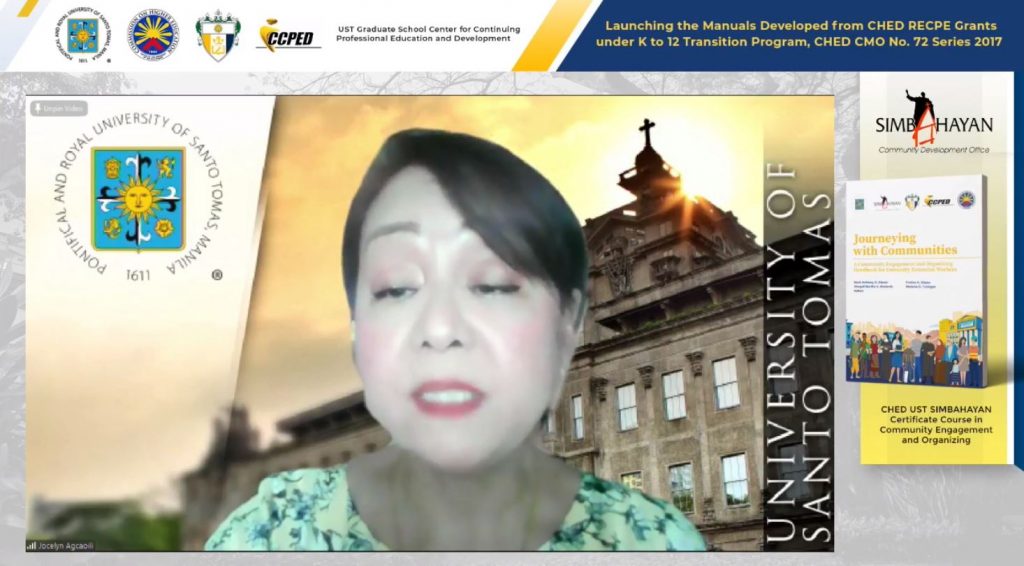
CCPED Director Agcaoili recounts the journey that led to the publication of the two manuals.
“Thanks to the tireless, enthusiastic and committed work of the training teams and the cohesive collaboration with CCPED, we were able to realize the grant expected outcomes of provision of capacity building opportunities for HEI personnel geared towards upscaling, specialization, and general promotion of professional advancement through non-degree certificate programs, and the application of knowledge and experiences gained through these activities to the improvement of curricula and programs of HEIs, plus the production of relevant research outputs.” Agcaoili said.
Watch the book launch here: https://www.facebook.com/ust1611ccped/videos/199639205260112




